Table of Contents Show
Enjoying camping vacations in an RV has become quite fashionable, and for many, it has even evolved into a lifestyle. Large Class A motorhomes and 5th wheels make it possible to carry along your entire life as you traverse the country.
But sometimes bigger is not always better. There has been a move recently to downsize RV life into smaller, more mobile vehicles that can take you further faster.
Can you give up a roomy coach for less storage but more accessibility? Let’s take a look at the pros and cons of smaller RVs!
What Is Considered a Small RV?
You can find small recreational vehicles in almost every type of RV. Below are the different types of small RVs that are most commonly seen.
Class C Motorhome
These campers are built on a truck chassis and come in lengths up to 32 feet. However, there are some models that range from 19’ to 24’ long that would still be considered ‘small RVs.’
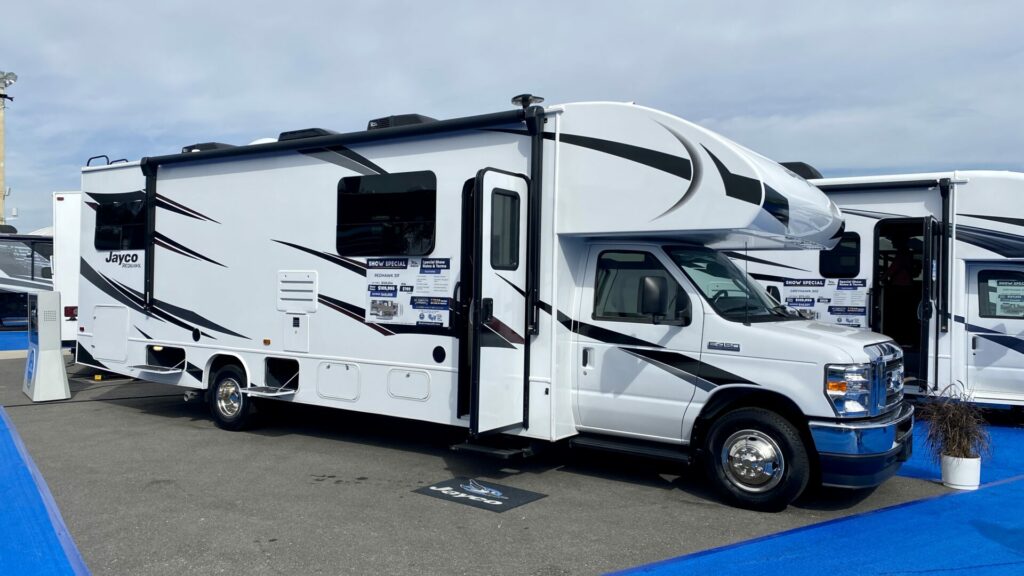
Class B Motorhome
Otherwise known as vans, these RVs usually range in size from 17’ to 22’ long. These are most common for solo travelers or couples as the sleeping space is limited.
Pop-Up Trailer
Also called a pop-up camper, these come in lengths from 10’ to 12’ long. This type of camper has a hard-sided metal or fiberglass base and tent sides that pop out.
Pro Tip: If you’re just getting started in the RV world, check out the 7 Best Pop Up Campers For Beginners!
Travel Trailer
Travel trailers come in a wide range of lengths. However, small travel trailers would be those that are 20’ and shorter.
Expandable Hybrid RV
These campers are a cross between travel trailers and pop-up campers, with hard sides but fold-out beds on either end. They are manufactured up to 32’, but the smaller ones range between 19’ to 21’ long.
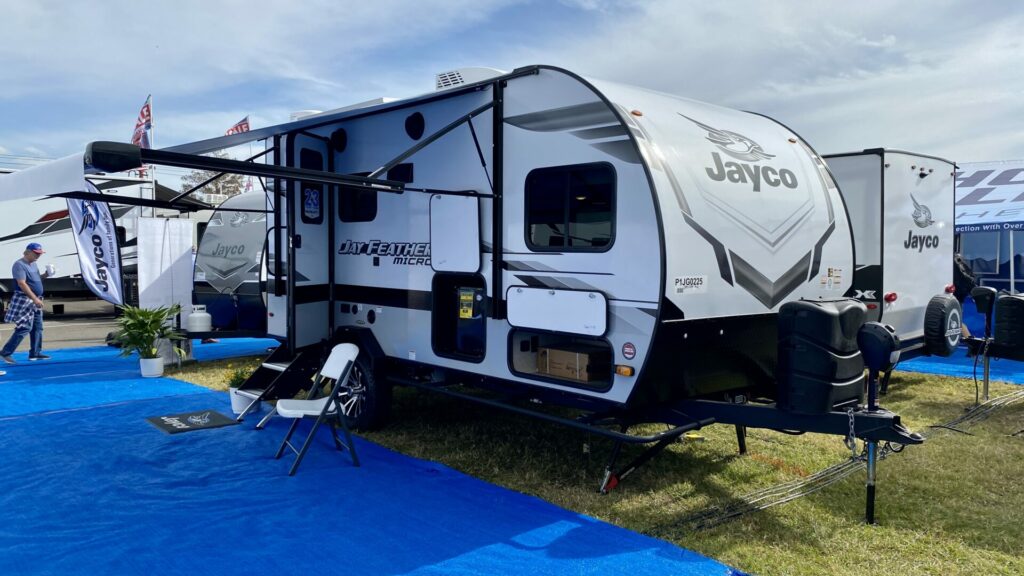
Benefits of Small RVs
There are numerous benefits to having a smaller recreational vehicle:
Mobility
Small recreational vehicles are easy to hop into and take off, getting into tighter spaces than their larger counterparts.
Additionally, the really small RVs, like Class B vans, can serve not just as a mobile home but also as a daily driver. This dual functionality adds value, as it eliminates the need for owning a separate vehicle for exploration.
Accessibility
Small RVs can easily navigate urban environments, making it possible to explore cities without worrying about vehicle restrictions often placed on larger RVs.
Additionally, the compact size allows travelers to venture into more secluded, off-the-beaten-path locations that are inaccessible to larger vehicles.
Maneuverability
Small recreational vehicles are much easier to drive because they have a shorter wheelbase and length. Tight corners, curves, and narrow parking spaces are usually no problem.
Learn More: If you know you want a Class C RV, you have to check out The Best Small Class C RVs!
Parking
Finding parking spots is significantly less of a hassle with a small RV. Whether it’s at a campsite, a parking lot, or on the street, the compact size fits standard parking spaces, eliminating the need for specialized RV parking.
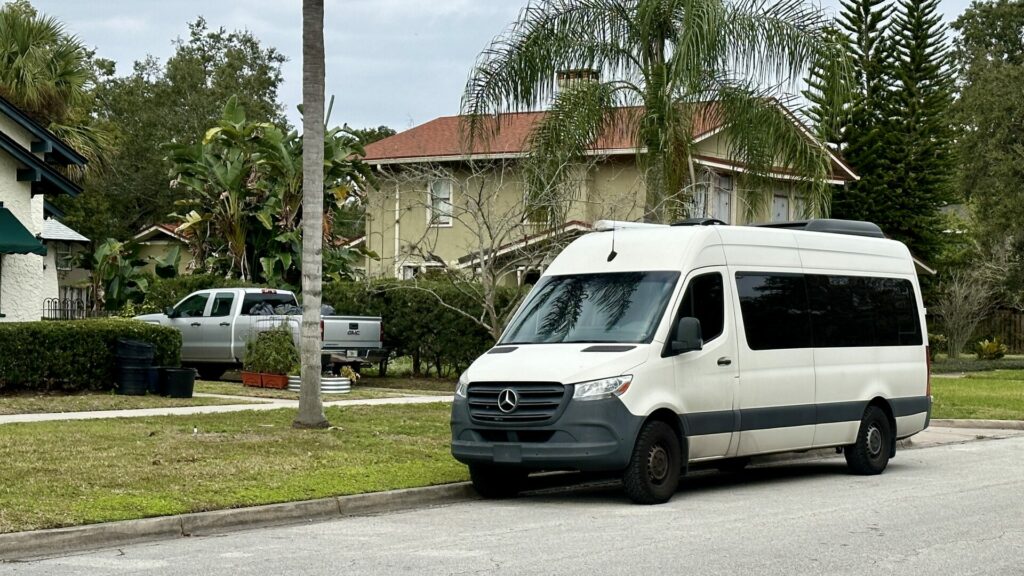
Better Gas Mileage
Smaller RVs typically have better fuel efficiency than larger models, making them more economical for long-distance travel. This can lead to significant savings in fuel costs over time, especially for frequent travelers.
Disadvantages of Small RVs
Limited Space
The most obvious disadvantage is the limited interior space. Small RVs can feel cramped, especially for longer trips or when traveling with multiple people.
Additionally, you might face storage challenges in a small RV. Travelers must be very selective about what they bring along, which can be problematic for extended trips or for those who like extracurricular activities like biking, kayaking, or stand-up paddle boarding.
Fewer Beds
Small RVs can’t accommodate more than a few sleeping areas. Typically, only two people can sleep comfortably in most small RVs; occasionally, four people if the layout is right.
You will find some that advertise they can sleep up to eight. This typically means the couch and dining area can be converted into beds.
While sleeping up to eight people is possible in a small RV, we don’t recommend it for long trips or full-time living.
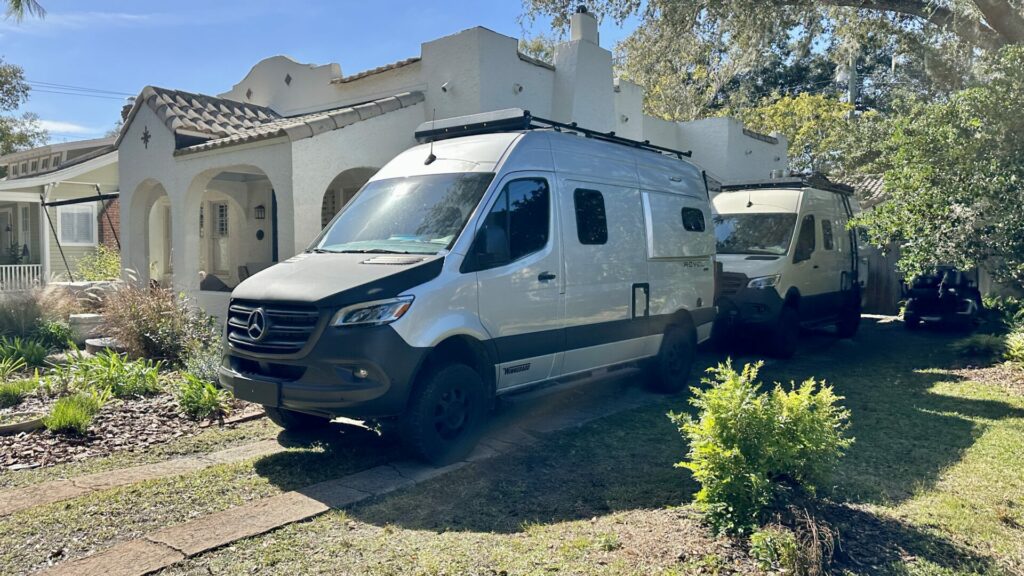
Cost vs. Space
Just because you’re buying a small RV, doesn’t mean you’ll see small prices. The cost per square foot can be higher with small RVs.
Class B vans are among some of the higher-priced RVs on the market. Buyers might find the trade-off between cost and the amount of living space not always favorable.
Pro Tip: Save some money by learning What the Cheapest State to Buy an RV Is!
10 Best Small RVs For Big Adventure
Whether you’re wanting a Class C or a Class B, we have ten of the best small RVs that won’t cramp your style.
Even if you’re a family of three or four, some of these floorplans have cab over beds and additional sleeping so everyone can have their own space.
1. Leisure Travel Vans Unity
RV Type: Class C
MSRP: Starting at $191,570
Number of Floorplans: 6
Sleeps: 2-4
Length: 25 feet 1 inch
GVWR: 11,030 pounds
Why It’s Small But Mighty: The Unity is a luxury Class C and is full of options. Whether you want twin beds, a corner bed, a rear lounge, a Murphy bed, or multiple living spaces, there’s a Unity floor plan for you.
With high-end upholstery and handcrafted cabinetry, you’ll feel like you’re traveling in style. The Unity is built on the Mercedes-Benz Sprinter 3500 cab chassis and offers advanced safety features like Active Lane Keeping Assist, Active Brake Assist, and Attention Assist.
Each floorplan sleeps two to four people and has a full kitchen and full bathroom.
2. Winnebago Porto
RV Type: Class C
MSRP: Starting at $182,681
Number of Floorplans: 1
Sleeps: 2-4
Length: 24 feet 5 inches
GVWR: 11,030 pounds
Why It’s Small But Mighty: With a large wall slide-out, the Winnebago Porto doesn’t feel like a small RV. The one floorplan features a queen bed, double nightstands, and a full bathroom in the rear.
In the center is the full kitchen, booth dinette (which can be changed out for theater seating), and a large pantry.
The cabover bed provides additional sleeping space. The Porto is also built on a Mercedes-Benz Sprinter chassis and offers advanced safety features like Lane Keeping Assist, Active Braking Assist, Hill Start Assist, and Crosswind Assist.
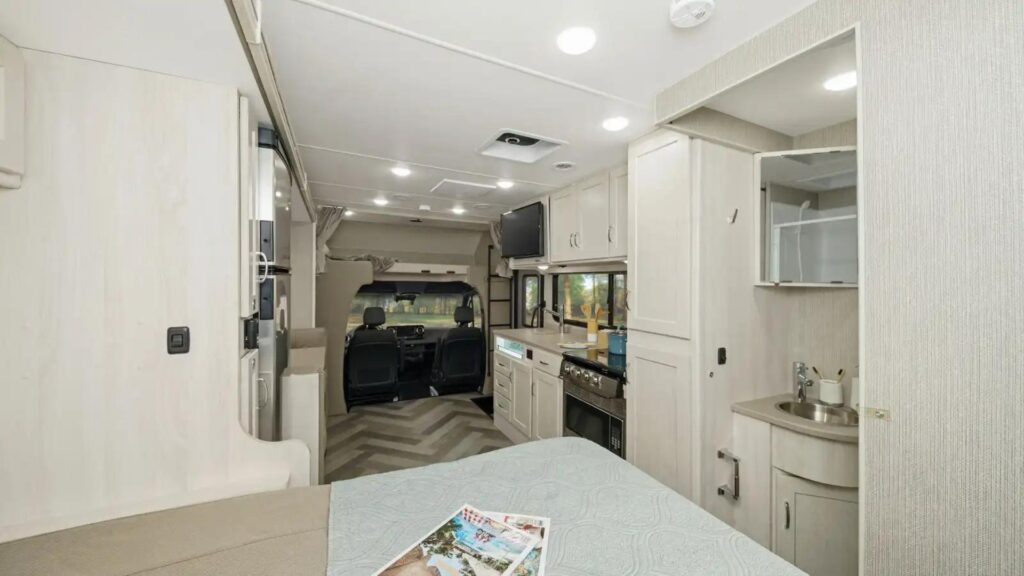
3. Winnebago Revel
RV Type: Class B
MSRP: Starting at $210,292
Number of Floorplans: 1
Sleeps: 2
Length: 19 feet 7 inches
GVWR: 9,050 pounds
Why It’s Small But Mighty: Like the Porto, the 4×4 Winnebago Revel is built on a Mercedes-Benz Sprinter chassis. The 3-liter turbo diesel engine and off-road capabilities of the Revel mean there’s nowhere that’s off-limits.
The rear power lift bed rises above the garage, where you can store all kinds of gear, from kayaks to bikes. There’s a bench seat with a removable pedestal table, a gear closet and wet bath, and an overhead cab shelf for additional storage space.
The kitchen features an induction cooktop stored in a drawer, a removable counter extension, a small refrigerator, and a sink.
Learn More: If you’re interested in this small RV and want to learn more, then read the full Breakdown of the Winnebago Revel!
4. Airstream Interstate 19
RV Type: Class B
MSRP: Starting at $200,681
Number of Floorplans: 1
Sleeps: 2
Length: 19 feet
GVWR: 9,050 pounds
Why It’s Small But Mighty: The Airstream Interstate 19 makes our list of the best small RVs because of its innovative design.
The number one best-selling Class B diesel motorhome for the past six years, the Interstate features a large rear lounge space that converts into a spacious sleeping area.
For remote workers who need connectivity while traveling, the workstation behind the passenger’s seat is a great idea. You have space to seat up to five and space to sleep up to two people.
Additional features include a wet bath, a large wardrobe, and a kitchen that is equipped with a two-burner gas stove, a large stainless steel sink, a convection microwave, deep drawers, a slide-out pantry, and a refrigerator with a freezer.
Pro Tip: Ready to learn more about this popular RV manufacturer? Then read Who Owns Airstream RV?
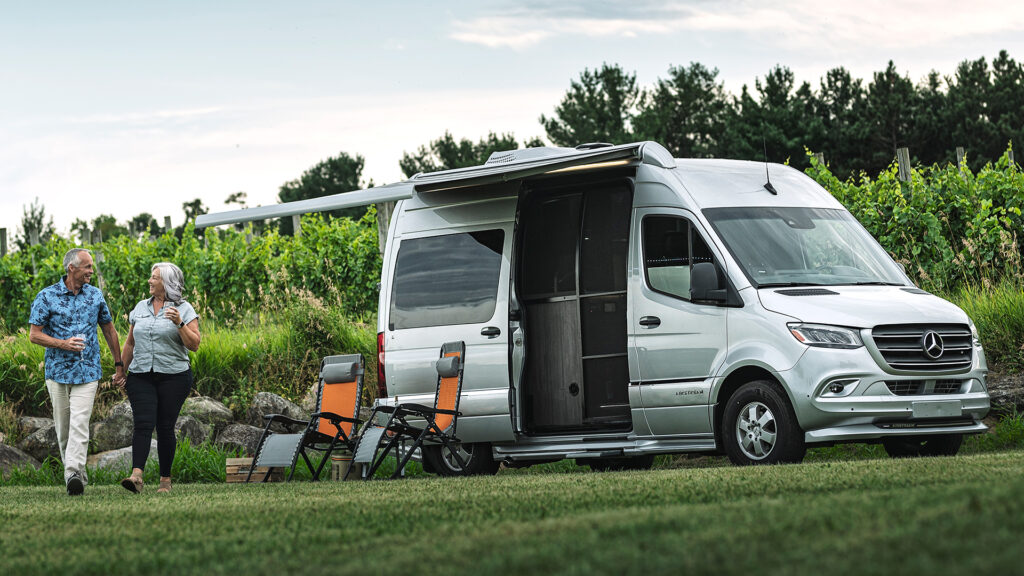
RV Type: Class C
MSRP: Starting at $217,555
Number of Floorplans: 3
Sleeps: 4
Length: 25 feet 6 inches
GVWR: 11,030 pounds
Why It’s Small But Mighty: Another Winnebago to make the list is the Navion.
With three floorplans that sleep up to four people, you can choose from a Murphy bed, a corner bed, and two twin bed options. Each model features a full bath, a full kitchen, and a lounge area.
The Navion is built on a Mercedes-Benz Sprinter chassis and is equipped with a 3.0 L 6-cylinder turbo-diesel engine.
Advanced safety features like Active Brake Assist and Lane Keeping Assist are included. Soft close doors, plush seating, and curved cabinetry make the interior of the Navion feel like home.
6. Thor Chateau
RV Type: Class C
MSRP: Starting at $116,700
Number of Floorplans: 12
Sleeps: 4 to 7
Length: Ranges 24 feet 1 inch to 32 feet 8 inches
GVWR: 12,500-14,500 pounds
Why It’s Small But Mighty: As you can see from the specs above, the Thor Chateau has the most options of any small RV on this list.
With 12 different floorplans, there’s an option for every type of traveler. Some units can sleep up to seven people.
Queen beds, king beds, twin beds, Murphy beds, and full beds are all options on the various floorplans.
The Thor Chateau is built on a Ford E-Series chassis with the option for a Chevrolet chassis. All models have a full kitchen, a full bathroom, and the Class C cab over bed for additional storage space or sleeping space.
Learn More: Thor is one of the “Big Four” in the RV manufacturer world. Learn How Many RV Brands Does Thor Industries Own?
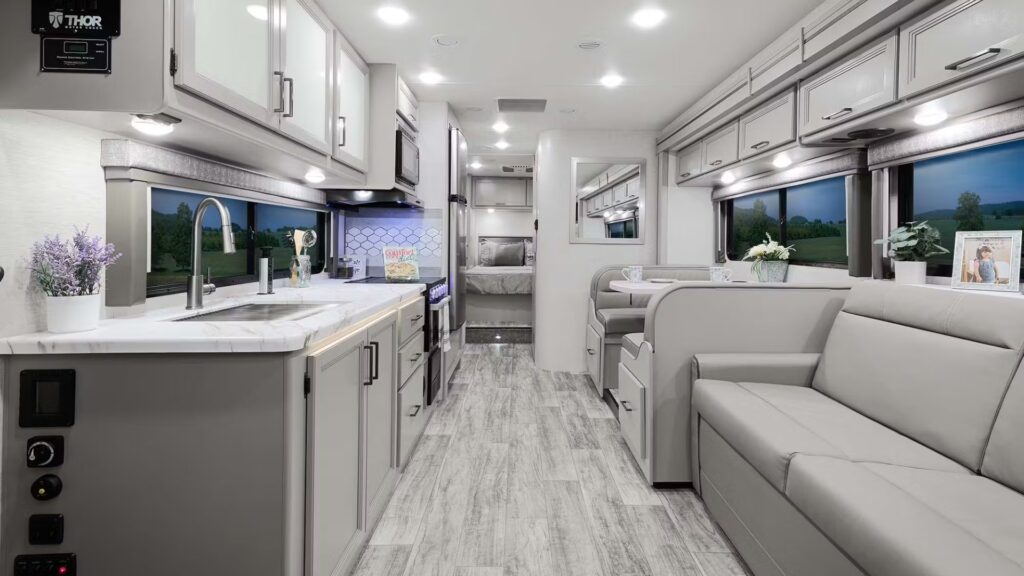
7. Coachmen Galleria
RV Type: Class B
MSRP: Starting at $198,000
Number of Floorplans: 4
Sleeps: 4 to 7
Length: 24 feet 3 inches
GVWR: 11,030 pounds
Why It’s Small But Mighty: The Class B Galleria is built on a 3500 Mercedes Sprinter extended platform and comes with a turbo-diesel “Blue TEC” engine.
In addition, the Galleria is equipped with a Truma Combi furnace/water heater system, an Onan generator, handcrafted maple cabinetry, three 110W panels, and soft-close doors.
The backup camera, heated side view mirrors, and heated front swivel seats make traveling a breeze.
One of the floorplans features a designated bed, while the other three feature larger lounge spaces that convert into a sleeping area. All of the Galleria Class B vans have a wet bath and a kitchen with a refrigerator, cooktop, and sink.
8. Gulf Stream Conquest
RV Type: Class C
MSRP: Starting around $128,000
Number of Floorplans: 18
Sleeps: 6
Length: 24 feet to 32 feet 11 inches
GVWR: 12,500 pounds to 14,500 pounds
Why It’s Small But Mighty: Like all Class C motorhomes, the Gulf Stream Conquest has extra sleeping or storage space above the cab area for larger families or friends hitting the road for a weekend.
Every unit has a full bathroom and a full kitchen. But with 18 different floorplans, you’ll have various bedroom and lounge layout options.
You can find U-shaped dinettes or booth dinettes, walk-in closets, or bunk beds. Each unit is built on a Ford E350 or E450 chassis.
Standard features include a double-door refrigerator, an oven with a 3-burner range, a microwave, a 4.0 kW generator, and an outside shower.
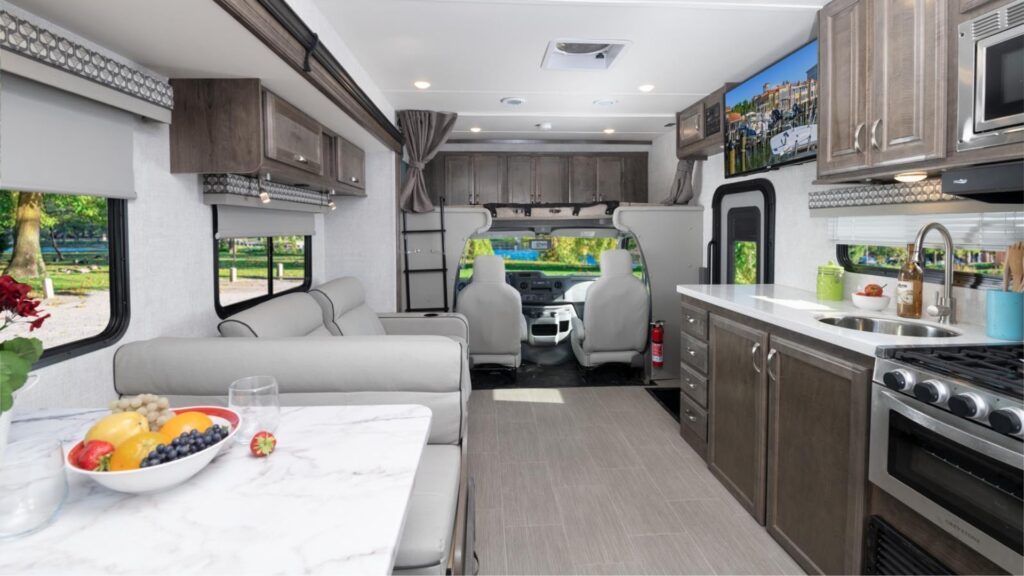
9. Dynamax Isata 3
RV Type: Class C
MSRP: Starting at $193,128
Number of Floorplans: 3
Sleeps: 4
Length: 24 feet 7 inches
GVWR: 11,030 pounds
Why It’s Small But Mighty: Another small RV built on the Mercedes Benz Sprinter platform is the Dynamax Isata 3.
Two floorplans feature a rear bedroom with a queen bed, a pantry and wardrobe closet, a full kitchen with a 3-burner cooktop, a double-door refrigerator, a sink, a convection microwave, and countertop extension, and a booth dinette.
The third floorplan option is coming soon, but it features a rear bath, Murphy bed, and a cap over bunk option.
It’s equipped with a 3.0L V6 Turbo diesel engine and safety features like Lane Keep Assist, Active Brake Assist, Crosswind Assist, Traffic Sign Assist, and Rescue Assist.
10. Entegra Odyssey
RV Type: Class C
MSRP: Starting around $115,000
Number of Floorplans: 7
Sleeps: 4
Length: 26 feet 8 inches to 32 feet 6 inches
GVWR: 14,500 pounds
Why It’s Small But Mighty: The last motorhome on our best small RVs list is the Odyssey by Entegra. These units are built on a Ford E-450 chassis and equipped with a 7.3L V-8 325 HP engine.
Upgraded features like a residential microwave, LED-lit kitchen countertops, porcelain toilet, backup and side-view cameras, and an 84-inch ceiling height make the Odyssey feel bigger and homier than many Class Cs.
All of the floorplans have a rear bedroom with a Muphy bed, queen bed, or king bed, a full bathroom, and a dinette. Some options have the space for a sofa, bunk beds, and additional storage wardrobes.
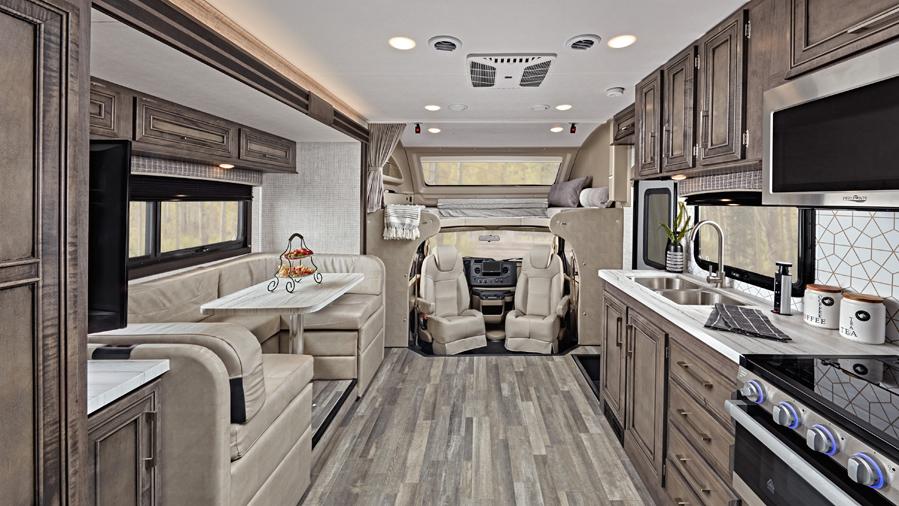
Good Things Come In Small Packages
As you can see, small RVs can be an efficient and comfortable way to see the country. They come in virtually any RV class and are usually easier to drive.
Only you can decide if one will work for your family size, camping style, and transportation needs. No matter what you decide, make sure to read 5 Things to Consider When Buying an RV before making a decision!






